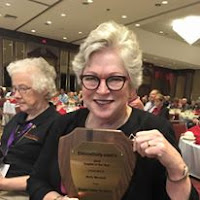After a year’s hiatus from the Cooperative Baptist Fellowship General Assembly, I was able to attend the recent meeting in Greensboro, North
Carolina. Over the next several days, I
will post some observations about the meeting. Of course, these are personal
responses and reflect only my own opinions.
Today, I will comment on the people present.
I continue to be pleased with the rich
diversity of those attending the General Assembly. There are still some gray hairs like myself,
but I was impressed by the youth of the group—both single and married young
adults. Someone commented that one of
the biggest challenges was finding stroller parking spaces! There were many present with young children
and babies, a sure way to grow the Fellowship.
The diversity also extended to the racial
and ethnic mix. There were a number of
African-American and Hispanic members of the Fellowship present and many are in
leadership roles. The number of Asian-Americans
did not seem great, but perhaps I am more sensitive to this because I work with
Central Baptist Theological Seminary which has a number of students with an
Asian background—especially Koreans and Burmese.
Some familiar faces are gone—Cecil Sherman
and James Dunn, for example, as well as many faithful Tennesseans who took the
lead in creating the state organization I led for ten years. They are missed.
Let me be a bit more specific about some people who were present
that made a special impression on me this year
First, Ka’thy Gore Chappell, leadership development
coordinator for CBF of North Carolina was honored with the Frankie Huff Granger
Distinguished Mentor Award by Baptist Women in Ministry. During her ministry in North Carolina and
Virginia, Ka’thy has encouraged both women and men to discover and use their
God-given talents. She exemplifies the best of those who have been faithful to
their call even when times have been tough.
I have only known Ka’thy for a few years but her enthusiasm and
commitment are contagious. The honor was
well-deserved.
Second, my friend and colleague Molly Marshall, president of
Central Baptist Theological Seminary, also received the recognition that she
deserves as one who has “been through the fire” and remained faithful to her
calling. Molly was recognized by the
Baptist Center for Ethics/EthicsDaily.com as the “Baptist of the Year” for
2015. She has been described in this
way by Robert Parham, executive director of the organization:
“She
is a Baptist trailblazer in interfaith and intercultural engagement at a time
when the cultural and religious tectonic plates are shifting. She leads with
word, institutional investment and a global presence.”
I
could not agree more.
Third,
Robert Parham himself is an inspiration to me.
He has served as the executive director of the
Baptist Center for Ethics/EthicsDaily.com for its entire life of twenty-five
years. Robert is a true entrepreneur who
has led the organization to adopt new ways to address the major issues of our
time—incarceration, immigration, economic justice, and interfaith cooperation,
for example—with creativity and insight. Robert is also a gifted leader who works
increasingly in the background while the young staff he has enlisted lead the way.
Fourth, one of my heroes of the faith, Brent Walker, Executive
Director of the Baptist Joint Committee for Religious Liberty, was recognized for
his leadership at a banquet attended by 700 of his closest friends on
Friday. Brent will retire at the end of
the year, after serving the longest of any staff member in the 80-year history
of an organization which champions religious liberty for all people. As the successor of James Dunn, he had big shoes
to fill, but he carved out a distinctive way forward for BJC and expanded its
services and advocacy into new areas.
Brent is not only a great leader but a humble, nice guy. He will be missed.
You may notice that none of these people is part of the national
CBF organization, although Ka’thy Gore Chappell is a staff member of a state
CBF organization. I think one thing they
have in common is their commitment to innovation and willingness to face a
challenge without fear. They also are
open to working with others who have similar commitments.
In the CBF world, partner organizations like the ones that these
individuals lead and serve play a pivotal role in the way forward for “free and
faithful Baptists.” Their cooperation
with other boards, agencies, and the CBF national organization is built on
relationships forged in grief, hope, and some fear but most of all in learning
to work together.
The CBF world is made up of people who have chosen to
voluntarily work with each other as these leaders do. Churches do not elect “messengers”
to the General Assembly. Ministers, partner
organization staff people, and laity come because they want to be there and be
part of something bigger than themselves.
They want to be part of the work of the Kingdom. That’s why I like being with them.




Comments